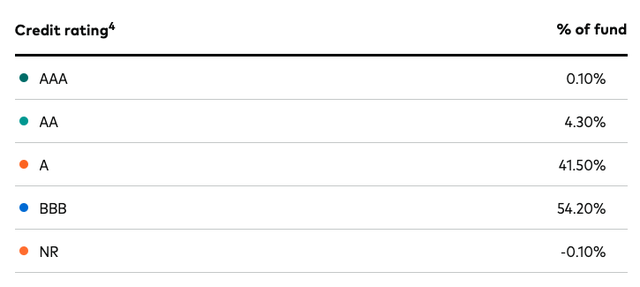VCIT: Why You Should Accumulate This Fund In An Economic Downturn

Summary
- VCIT owns a portfolio of intermediate-term investment-grade corporate bonds.
- The fund should outperform its treasury fund peers in the same category in the long run.
- VCIT may experience a negative spike in its fund price in the upcoming recession.
- Investors should view this as a good opportunity to accumulate.
designer491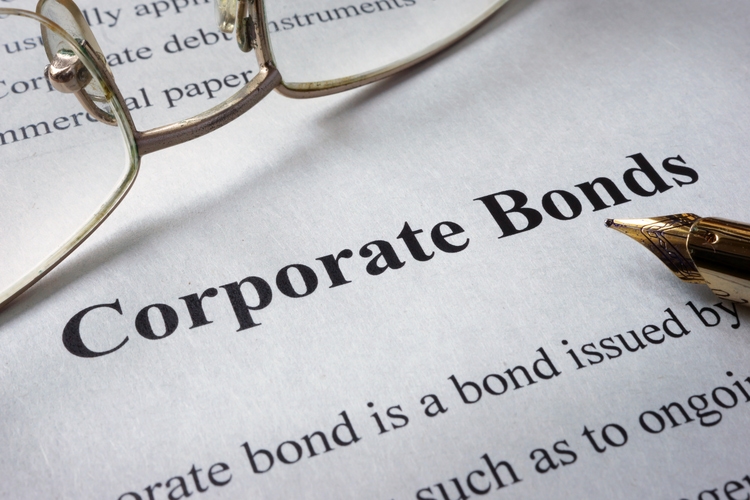
ETF Overview
Both U.S. treasury and investment grade corporate bonds are bonds with minimal credit risk than high-yield bonds. However, which one is the better choice? In this article, we will analyze Vanguard Intermediate-Term Corporate Bond ETF (NASDAQ:VCIT) and provide our insights and recommendations.
VCIT invests in investment grade corporate bonds in the United States. The fund offers higher yield that other treasury funds in the same category and hence should result in better long-term return. However, over half of its portfolio belong to BBB-rated bonds, the lowest rating investment grade bonds. Some of these bonds may be downgraded to non-investment grade bonds in a recession. Therefore, we expect some downside in its fund price in the upcoming recession. However, investors should view this as an opportunity to accumulate shares as the downside will likely be temporary.
YCharts
Fund Analysis
VCIT has performed poorly since 2021
VCIT has not performed well since reaching its cyclical peak in mid-2020. As inflation increases due to the reopening of the economy, the Federal Reserve was forced to aggressively hike its rate in 2022. As a result, VCIT has declined by over 17% since the second half of 2020. In general, the longer the duration of the bonds, the more sensitive its price is to the change of rate. As we can see from the chart below, Vanguard Short-Term Corporate Bond ETF (VCSH) has only dropped by 8.35% during the same period. This was primarily due to its shorter duration bonds in its portfolio than VCIT. On the other hand, Vanguard Long-Term Corporate Bond ETF (VCLT) declined by nearly 30% in the same period. This much higher decline rate was primarily due to the longer duration bonds in its portfolio than VCIT.
YCharts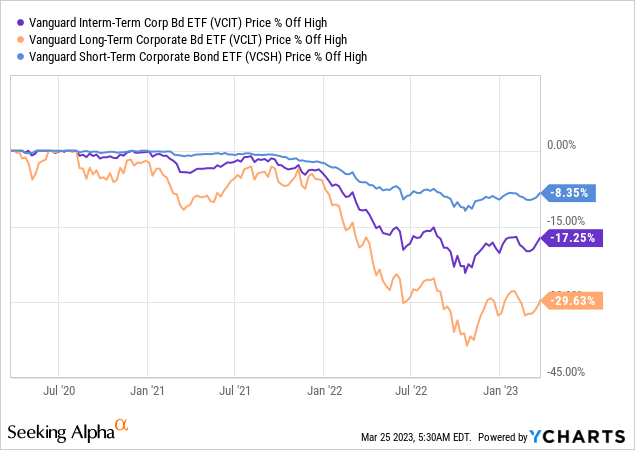
VCIT outperformed its treasury peer in the long run
Corporate bonds tend to offer higher yield than U.S. treasuries. Therefore, corporate bond funds should accumulate more interest income in the long run. VCIT currently has a 30-day SEC yield of 5.27%. This is much higher than the 3.92% yield of Vanguard Intermediate-Term Treasury ETF (VGIT). Since VCIT owns a portfolio of investment grade corporate bonds, the default rate should be quite minimal. Therefore, its total return should eventually outpace VGIT given its better yield. As can be seen from the chart below, VCIT's total return of nearly 69% since 2010 was way better than VGIT's 31%.
YCharts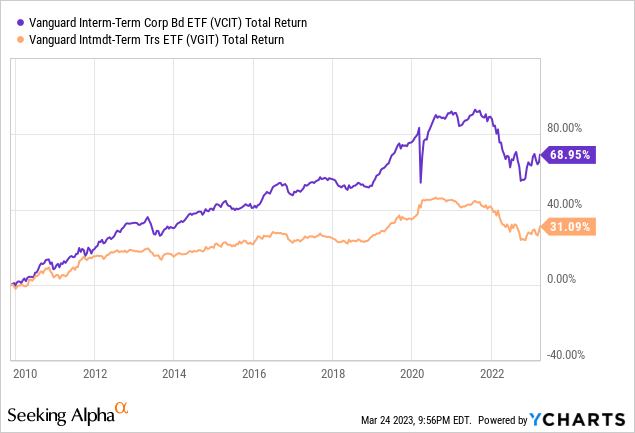
However, corporate bonds have substantial downside risk
Although, VCIT has better total return in the long run, its near-term risk is much higher than VGIT. This is especially the case if the economy is heading for a recession. As we can see from the chart below, VCIT's fund price experienced a negative spike amid the outbreak of COVID-19 in 2020. In contrast, VGIT's fund price was very firm. This is because investors often view U.S. treasuries as risk-free assets and tend to rotate money out of riskier assets such as corporate bonds into treasuries.
YCharts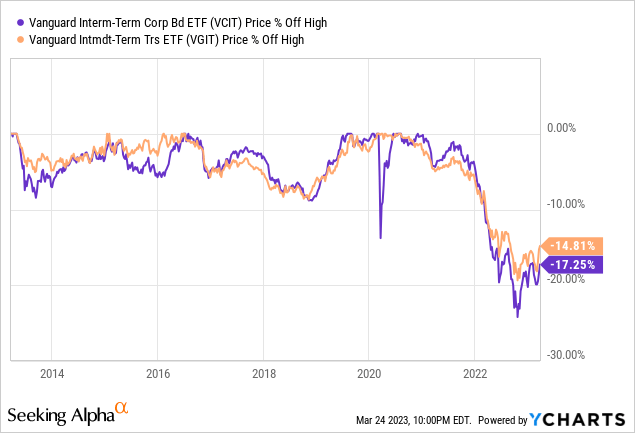
Another reason that VCIT tend to experience a negative spike in a recession is because more than half of VCIT's portfolio are bonds that are BBB-rated bonds. As can be seen from the table below, BBB-rated bonds represent 54.2% of VCIT's total portfolio. This is the lowest rating bonds in the investment grade category and is vulnerable in an economic recession. In an economic recession, some of these bonds may be downgraded to non-investment grade bonds and hence its bond prices may fall.
Investor Takeaway
Looking forward, we are likely near the end of this rate hike cycle. Therefore, the impact of change of rate on VCIT's fund price will likely be small. However, a recession may not be too far away as we believe the Federal Reserve's policy of keeping the rate elevated beyond 2023 may eventually result in a recession. As we have discussed earlier, in a recessionary environment, VCIT's fund price may experience a negative spike. However, investors should not be concerned. As soon as the market fear subsides, its fund price will climb up again. Given that the Federal Reserve will usually lower the rate in a recession, we see good upside potential following the negative spike. Hence, we recommend investors to see this negative spike as a buying opportunity and accumulate more shares. You will have a good return in the long run.
This article was written by
Disclosure: I/we have no stock, option or similar derivative position in any of the companies mentioned, and no plans to initiate any such positions within the next 72 hours. I wrote this article myself, and it expresses my own opinions. I am not receiving compensation for it (other than from Seeking Alpha). I have no business relationship with any company whose stock is mentioned in this article.
Additional disclosure: This is not financial advice and all financial investments carry risks. Investors are expected to seek financial advice from professionals before making any investment.
